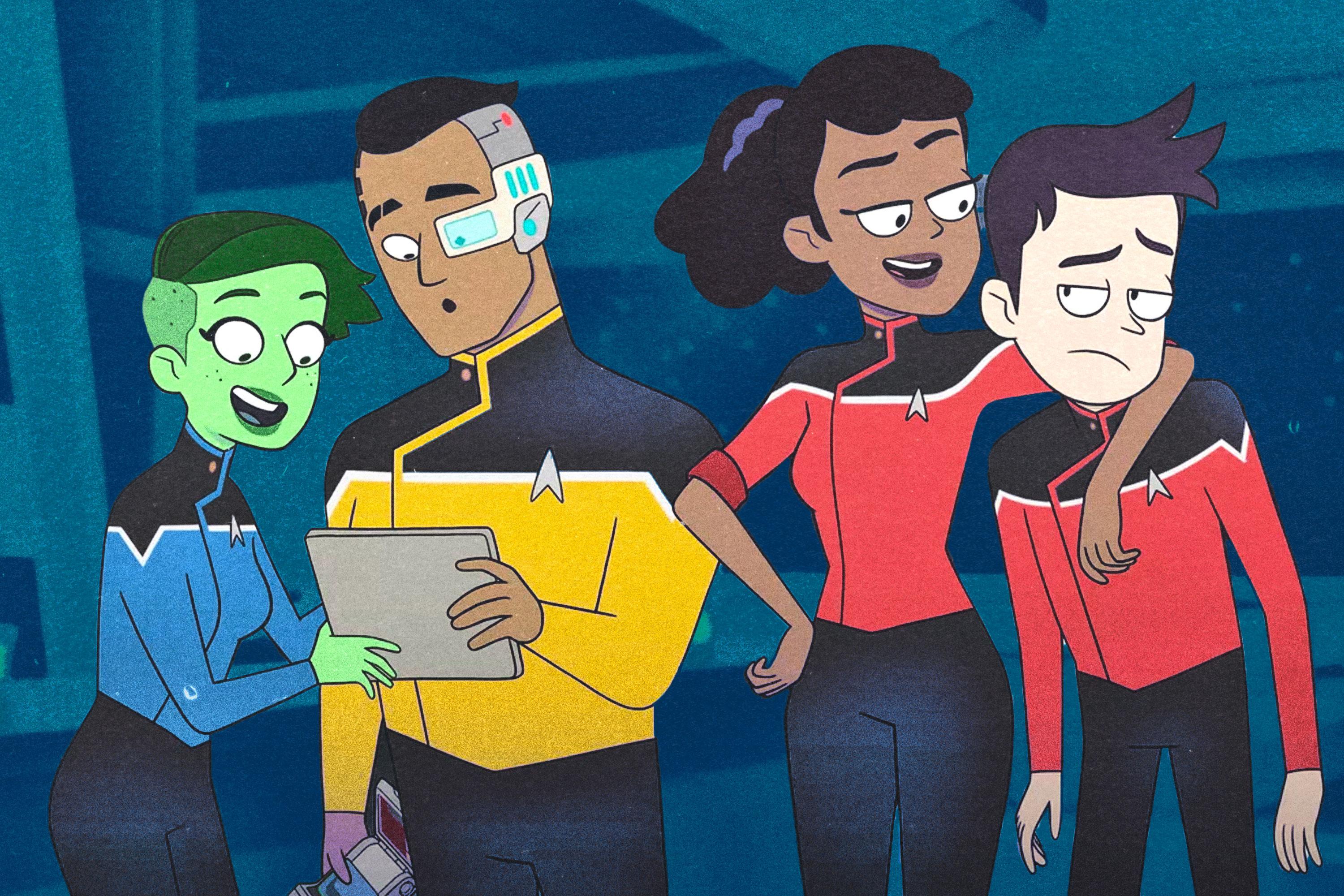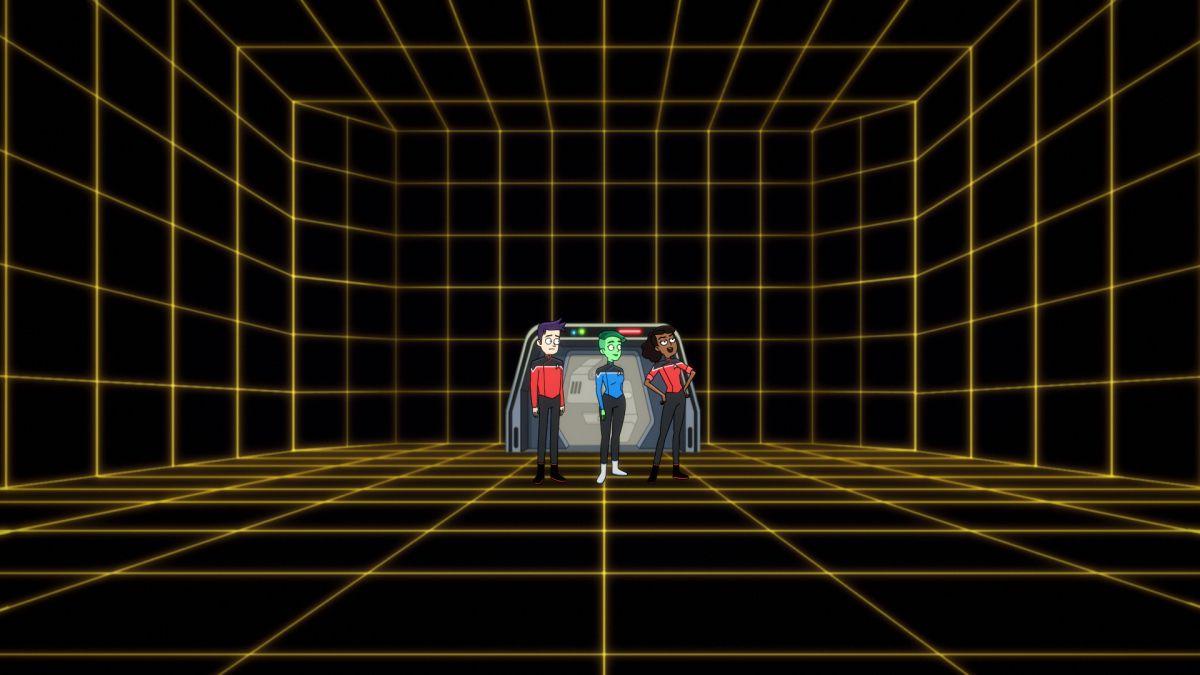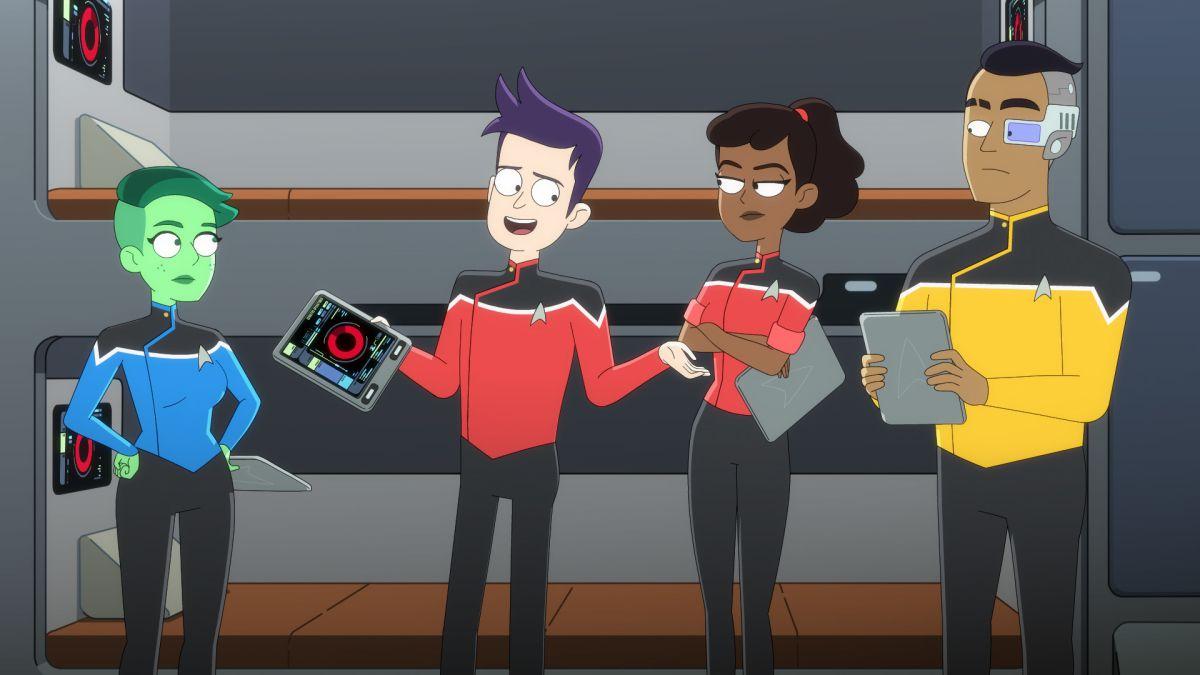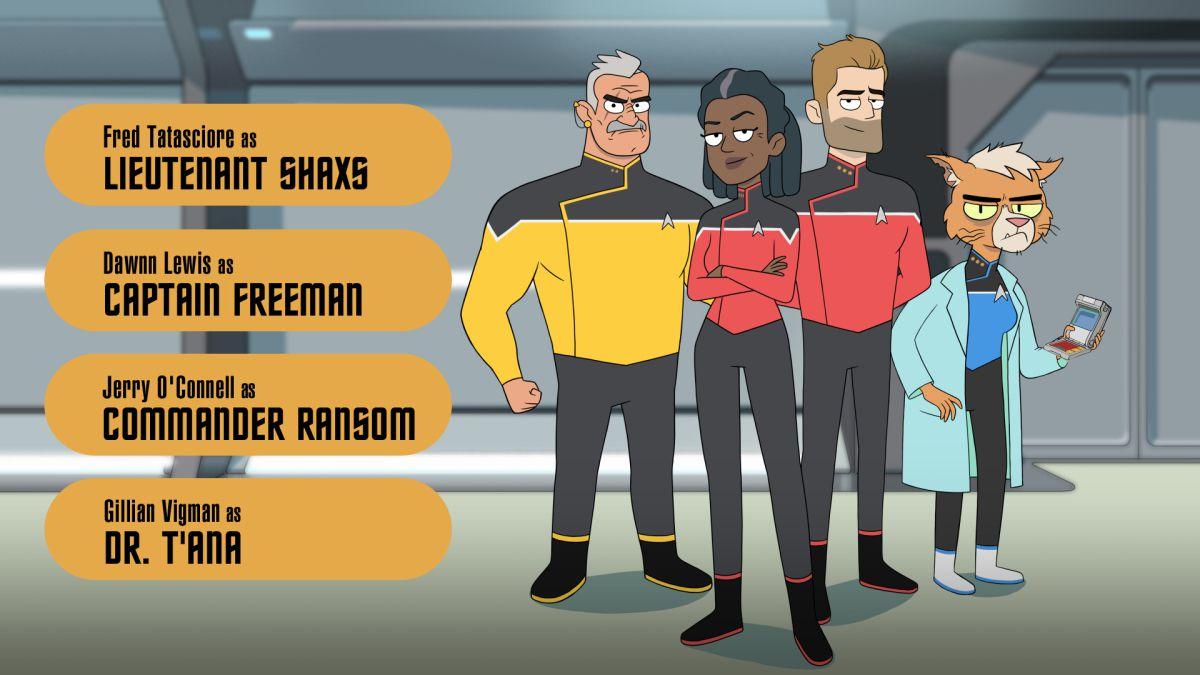
In the Star Trek: The Next Generation episode “The Perfect Mate,” the Enterprise transports an “empathic metamorph” named Kamala, whose special powers of personality make her an irresistible romantic partner. Kamala, who’s played by Famke Janssen, has been promised to a foreign leader in an arranged marriage meant to bring peace to two warring worlds, but that doesn’t stop her from seducing Commander Riker, who escorts her to her quarters. With difficulty, Riker resists her powerful pheromones and reminds her that she’s promised to another. “I know my role in history, Commander,” she says. “But it’s going to be a long voyage.” Riker responds, “It certainly is,” then steps into the corridor and utters a line dripping in sexual subtext: “Riker to Bridge. If you need me, I’ll be in Holodeck Four.”
What does the Enterprise’s resident horndog do in the holodeck to relieve his frustration? We can guess what his faptain’s log might look like based on his makeout session with the computer-generated “knockout” the holodeck delivers in the episode “11001001,” when Riker requests someone “more sultry.” Or, for that matter, on the holodeck-addicted Lieutenant Barclay’s fantasy versions of female crewmates Crusher and Troi in the episode “Hollow Pursuits.” If that doesn’t make it clear, just think of the holodeck brothel Quark is clearly running on Star Trek: Deep Space Nine.
Yes, the holodeck is a place to live out less lurid dreams (like playing baseball). But it’s also a safe space for the officers of Starfleet to get freaky. “As far as I’m concerned, what you do in the holodeck is your own business, as long as it doesn’t interfere with your work,” Lieutenant La Forge tells Barclay. But what if it creates more work for others? Who tidies up after Riker, well, finishes?
For that, there’s the low-ranking crew that works far below the bridge of the USS Cerritos in Star Trek: Lower Decks, an animated comedy that premiered on CBS All Access on Thursday. Riker once asserted that “the ship will clean itself,” and maybe the biomatter resequencers or janitorial robots can erase some stains. In the Lower Decks episode “Moist Vessel,” however, we learn that unlucky ensigns are assigned to “holodeck waste removal.” In the words of Ensign Mariner, the skilled but unambitious and rebellious ex-officer voiced by Tawny Newsome, “If I’d known I was going to be emptying the holodeck biofilters, I wouldn’t have had so much for breakfast.”

Imagining the less glamorous aspects of Starfleet life is a staple of Trekker conversations. “People who love Star Trek love finding other people who are into Star Trek,” says Lower Decks creator and showrunner Mike McMahan. “Like, ‘Oh, you like Worf? I like Worf too. Let’s talk about Worf for a while.’” That impulse may have yielded fan fiction about holodeck janitors, but with rare exceptions such as the ensign-centric seventh-season TNG episode “Lower Decks”—an eponymous source of inspiration for McMahan’s new series—it hasn’t found full expression inside Star Trek canon. But these days, relatively little is off limits for Star Trek, including cleaning up the residue of a sensual stardate. “I think Star Trek can be many, many, many things,” says McMahan.
In terms of TV series, Star Trek is already many more things than it’s ever been before. The Star Trek film franchise has been limping along on impulse power since 2016’s Star Trek Beyond, but on the small screen, Star Trek’s fictional universe is expanding almost as fast as the physical universe. After Enterprise concluded in 2005, Star Trek lay dormant on TV for more than a decade, and before the premiere of Discovery in 2017, the whole history of Star Trek encompassed six series (including the questionably canonical cartoon from the ’70s). In 2021 alone, though, we’ll likely see six Star Trek series airing (pandemic permitting), not counting the Emmy-nominated Short Treks webisodes. The current lineup consists of Lower Decks (which received a two-season order), Discovery (which returns for a pandemic-delayed Season 3 in October and is rumored, though not confirmed, to have been renewed for Season 4), and Picard (which premiered in January and seems set to run for at least three seasons, though the third hasn’t been announced). And then there’s a trio of forthcoming shows: Prodigy, an animated, kid-centric series slated for Nickelodeon, and two Discovery spinoffs, Strange New Worlds and Section 31, which will join Lower Decks, Discovery, and Picard on All Access.
The industry’s shift toward shorter TV seasons has reduced the new series’ screen time compared to the first five live-action shows—all of which aired 26-episode seasons during their runs—but that’s still a lot of Trek to keep track of. The person constructing the trellis that supports this sprawling Star Trek infrastructure is Alex Kurtzman, who cowrote and produced the big-screen Star Trek and Star Trek Into Darkness before signing a five-year contract in 2018 to oversee the franchise for CBS TV Studios. Kurtzman, who pulls Star Trek’s strings at Secret Hideout, the production company he founded and owns, says, “The way that we are looking at the Trek universe now is that it doesn’t have to be defined by only one kind of tone. It should actually be able to expand into covering lots of different tones and lots of different feelings.” Without taking chances on a broad spectrum of series, he adds, Star Trek “won’t grow, it won’t iterate into something new. And I think what we’re doing is, we’re giving ourselves room to experiment.”
McMahan, who sold Kurtzman on his vision of a show about “the people who put the yellow cartridge in the food replicator so a banana can come out the other end,” says, “I think he’s a genius in the way that he’s expanding Star Trek by finding people who love Star Trek and asking them what excites them about Star Trek.” For McMahan, a former Rick and Morty writer and producer who also cocreated Solar Opposites (another animated sci-fi sitcom that premiered on Hulu in May), that’s the comedic side of Star Trek, which emerges in the mundane moments between red alerts and phaser fights on TNG and other preexisting series but remains an undiscovered country as a focus for a Star Trek–branded show.
McMahan has been fondly spoofing Star Trek since he started the “TNG Season 8” Twitter account in 2011, which led to the 2015 book Warped: An Engaging Guide to the Never-Aired 8th Season. (He also wrote a Short Treks episode that starred Rainn Wilson as comedic con artist Harry Mudd.) Although the most devoted fans of Star Trek are regularly lampooned in pop culture, the utopian, pro-science, altruistic ethos of the franchise makes it more resistant to satire than, say, Star Wars, which has been parodied relentlessly in movies, series, and skits from Spaceballs to Robot Chicken, Family Guy, and the works of Simon Pegg (not that Family Guy hasn’t dabbled in Trek too). The themes of Star Trek, McMahan says, “make it sort of unparodiable in some ways. But it’s also those themes that allow you to write funny characters that inhabit that, who can still love all that stuff but have human flaws and human desires.”
Hence the Cerritos, whose continuing mission is to not-so-boldly go where somebody has been before. The Cerritos’s task is to make second contact: As by-the-book Ensign Boimler (Jack Quaid) puts it, “We get all the paperwork signed, make sure we’re spelling the name of the planet right, get to know all the good places to eat.” Even the name of the ship is indicative of its unsexy status: The California-class ship is named after Cerritos, rather than one of the Golden State’s more prestigious cities, because McMahon used to hear radio ads for the Cerritos Auto Square when he worked as a PA. By concentrating on the undesirable duties and backwater worlds that would be below captains Kirk or Picard, Lower Decks can explore new nooks and crannies of Star Trek lore, drilling down into minutiae à la the Death Star discussion in Clerks. “That’s something I don’t know if you’ve seen as much in a Star Trek show, the soup-to-nuts post–Starfleet Academy rise of these characters,” McMahan says.
Lower Decks features four core noncommissioned characters: the odd-couple combo of Mariner and Boimler, and two other ensigns, unabashed Starfleet superfan Tendi (Noël Wells) and semi-competent engineer Rutherford (Eugene Cordero), who’s still getting the hang of existence as a cyborg. The underlings are linked to the command crew by Captain Freeman (Dawnn Lewis), who—unbeknownst to the other ensigns—is Mariner’s mother. These aren’t Starfleet’s first-team all-stars, but the crew is committed to its mission. Similarly, Lower Decks adheres to Star Trek’s central philosophy, even as it deviates from its typical tone. “I just think that there are some key elements that you can’t break about Trek,” Kurtzman says. “Ultimately it has to reinforce [Gene] Roddenberry’s essential vision of an optimistic future.” Kurtzman also insists that “every episode actually has to be a great Star Trek episode. It can’t just be a lot of jokes.”

Ensuring that the humor of Lower Decks comes from a place of affection for Trek, as opposed to “punching down” at its ideals, was the Prime Directive for its creator, who cites spiritual predecessor Galaxy Quest as the template for a loving send-up of Trek tropes. “If you went into it trying to poke holes or find reasons that the Federation wouldn’t be good, you could do that. But then it’s not Star Trek anymore,” he says. He also steered his writers away from an idea for a plot line in which Kirk pilots a space Uber, which might have been funny but wouldn’t have been true to Trek. The show he envisioned—and, through the four episodes provided to critics, largely succeeded in creating—is “just one step away from being a classic, dramatic Star Trek show without taking the air out of the tires of what makes Star Trek, Star Trek.”
Not everyone who watches Lower Decks will know what makes Star Trek, Star Trek, which forced the writing staff to strike a balance between accessibility and catering to diehards who grok every inside joke. One early episode delivers a great gag about the long-suffering Miles O’Brien, which would be opaque to anyone who isn’t familiar with Colm Meaney’s character on The Next Generation and Deep Space Nine. “There were like a hundred different jokes at the end there,” McMahan says. “And then we landed on the Chief O’Brien joke because it was like, ‘You know what? If you don’t know who Chief O’Brien is, fine. But if you do, it was making us laugh.’”
To tighten their connection to Trek tradition, McMahan and his writers conducted a Star Trek TV club, in which they would watch one old episode a night and discuss it the next day. But he also stocked his writers’ room with some Star Trek neophytes who could gauge whether jokes landed without a comprehensive recall of the contents of Memory Alpha and help trim references that seemed inserted solely for the sake of referencing. “The references in the show are either used for comedic purposes or for sci-fi texture,” he says. “They should feel so nonstop that if you haven’t seen Star Trek, it feels like a mythologically broad sci-fi show that has a clear understanding of the world that it inhabits. But if you do know Star Trek, you’re like, ‘Holy shit, that’s a Bat’leth.’” The best-case scenario, McMahan continues, is that someone might like Lower Decks enough to seek out previous series, which would make him a missionary of sorts for the franchise that he loves so deeply he believes it should be a municipal service. “I think when you move into a new house, you should get a little screen that just has the new Star Trek on it all the time, no matter where you live,” he says.
Those screens would be better stocked than ever in the era of six concurrent Star Trek series. That heavy Trek traffic places additional demands on each showrunner. Lower Decks is set in 2380, one year after Nemesis, the final film to feature the TNG crew. As with Picard, then, the potential existed for frequent cameos from nostalgia-triggering legacy actors. McMahan says he found a couple of places to incorporate Trek vets for reasons that made sense in a story, but he found that the other signifiers of Star Trek—the music, the bridge, the weapons, the aliens, and so on—usually sufficed in supplying the proper atmosphere. When he did dip into other Trek casts, he had to communicate closely with Kurtzman’s team at Secret Hideout to avoid “getting in the way of other people’s canon.”
The question of crossovers comes up often for Kurtzman, who says he’s studied Disney’s Star Wars reboot and Pixar’s, Marvel’s, and DC’s cinematic and TV universes to develop dos and don’ts of franchise-building. One key, he says, is consistency of brand: While each individual entry should differ from the others, they should all provide experiences that share certain predictable traits. Another is to gradually build up to an Avengers event instead of skipping straight to a Batman v Superman: Dawn of Justice.
“Let’s focus on making singular great shows with great characters that audiences fall in love with,” he says. “Let’s let them live in that world. And if we can create enough of those and the stories get to a place where it starts to make sense to blend shows or characters together, great. But don’t start out with that goal.” And, he concludes, don’t overindulge in fan service, which backfires if it feels unearned.
Disney’s aggressive rollout of new Star Wars films—which the company has since slowed down—illustrates the risks of saturation. But Kurtzman isn’t concerned about flooding the market with too much Trek TV. “We’re living in a world where more is more when it comes to television,” he says. “The consumption culture that we live in now when it comes to programming, it’s so ravenous that I think the duty of what we’re doing is to make sure that each show actually doesn’t cannibalize the other shows, has its own individual identity.”
Initially, Discovery was different because it was serialized; now, it sets itself apart thanks to a Season 2 time jump that took it into the 32nd century, a thousand years after The Original Series. Picard is unique because it revolves around a single character who operates independently of Starfleet. Strange New Worlds will be an episodic throwback to The Original Series starring Discovery’s versions of Spock and Captain Pike, and Section 31 will probably be darker and geared toward intelligence and subterfuge. Lower Decks is an animated comedy, and Prodigy will be geared toward a younger audience. In theory, each new series is distinctive enough to carve out its own narrative niche. And if each lays claim to a separate section of the calendar, the sun may never set on the Star Trek TV empire.
“Strange New Worlds will be more stand-alone individual adventures, planet of the week, alien of the week, the way TOS was,” Kurtzman says, adding, “There will, of course, be emotional serialization on Strange New Worlds, but it is going to be a return to form and a return to the classics.” Section 31, which will see Michelle Yeoh reprise her role as the amoral, manipulative mirror-universe Captain Georgiou from Discovery, may not be as easy a sell to longtime Trekkers. “I would argue it’s really essential for Star Trek to have the freedom to travel into places that may initially feel scary and unsafe and different,” Kurtzman says. “But I think I can assure the fans that we’re never going to make the dark, dark, dark version of Star Trek that just blows apart everything you love about it.” (I’m all for freedom and novelty, but I do miss the days when Star Trek torture scenes were more about bright lights than eyeball-based body horror.)

While uneven at times, Discovery and Picard were met with modest critical acclaim, but it’s tough to assess how they’ve engaged audiences. CBS All Access doesn’t publicize viewership numbers or subscription counts—a spokesperson offered only that the service’s Star Trek originals are “some of the most watched series on CBS All Access”—but it still seems eager to be in the business of Star Trek. “I get enough sense of the numbers to know that they’re quite good,” Kurtzman says. “And I know they keep ordering our shows, which means that they’re working for All Access and for Viacom.”
Those orders keep Kurtzman busy: In addition to co-showrunning Discovery with Michelle Paradise, he has a hand in every other project. He delegates a lot of the choices on the non-Discovery series to the voices he’s entrusted with the keys to the IP, but he still steps in periodically. “If I see that a show is heading down a road that feels like it’s going to ignite the wrong reactions when it comes to Trek, I have to speak up about it,” he says. He’s also heavily involved in postproduction, particularly on the live-action series. “That’s another area that I think is part of my job, is to get in there and not only cut the shows, but also mix the shows, color-time the shows, and monitor all the visual effects.”
On the visual side, Kurtzman says he holds the small-screen series to the same standard as the recent films. When Star Trek returns to theaters—assuming anything does—the would-be blockbusters will have to work harder to differentiate themselves from their small-screen cousins and identify stories that are better suited to two hours than 10. “It’s not going to be about scope and scale anymore,” he says. “We’ve got plenty of that on our shows.”
It’s not clear how long Lower Decks can keep up the comedy without straying somewhat from its title and premise. McMahan is currently writing the second-season finale and confirms that his characters are still ensigns, but he says they’ve undergone growth. “The nice thing about existing Star Trek shows, it’s created the idea that you can watch seven seasons of somebody being an ensign, for better or for worse for those characters,” he says. “But I don’t really love the idea of making a show where everybody’s trapped in amber.”
Kurtzman’s contract ties him to CBS for a few more years, and he isn’t standing still either. He landed that deal by pitching CBS on a five-year plan that called for five to seven carefully curated and coordinated shows. The final pieces of that plan are about to be in place. “I guess pretty soon we’re going to have to come up with another five-year plan,” he says. As another captain of Star Trek once said, let’s see what’s out there.
This post originally stated Discovery was officially confirmed for Season 4.

